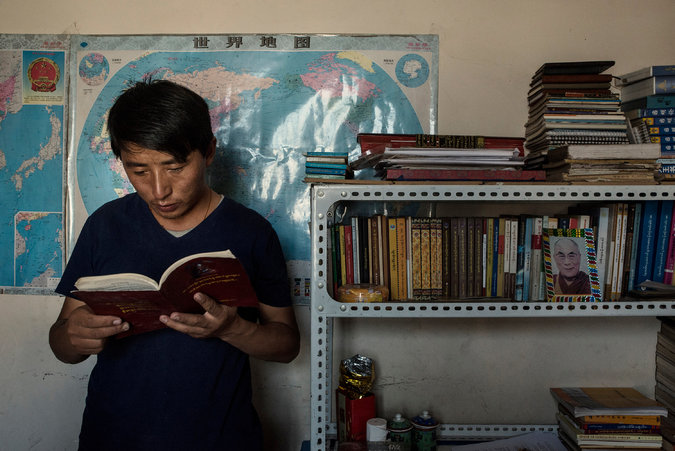Tibetan entrepreneur and language education activist Tashi Wangchuk was detained in January 2016, two months after being featured in a New York Times video report about his fight to preserve the Tibetan language, which is fading due to government efforts to enforce Mandarin learning and the increased economic viability of the latter. After being charged with “inciting separatism” in March 2016, Tashi Wangchuk stood trial in January 2018 where the main evidence used against him was the New York Times video. This week, he was sentenced to five years in prison. The New York Times’ Chris Buckley reports:
The businessman, Tashi Wangchuk, heard the verdict in Yushu, a heavily Tibetan town in Qinghai Province, northwest China, his defense lawyers, Liang Xiaojun and Lin Qilei, said by telephone. Mr. Tashi had warned that there and across many historically Tibetan areas in China, the Tibetan language was threatened by official policies to make Mandarin Chinese the language of schooling and government.
[…] His prison term will start from the time of his arrest, meaning that he will be due for release in early 2021, his lawyers said.
[…] The guilty verdict came as no surprise. China’s Communist Party-controlled courts rarely find defendants in criminal trials innocent, and virtually never do so in politically charged cases like this.
But human rights organizations and advocates of Tibetan self-determination promptly denounced the verdict as a sign of the Chinese government’s growing intolerance of critics of its ethnic policies, even relatively mild ones like Mr. Tashi.
[…] At his trial in January, Mr. Tashi, speaking in Chinese, rejected the idea that his efforts to rejuvenate the Tibetan language were a crime. He has said that he does not advocate independence for Tibet, but wants the rights for ethnic minorities that are promised by Chinese law, including the right to use their own language. [Source]
AFP reports on plans to appeal the verdict, and summarizes the content of the 2015 New York Times video documentary used against Tashi Wangchuk in court:
“Tashi plans to appeal. I believe he committed no crime and we do not accept the verdict,” lawyer Liang Xiaojun told AFP.
[…] In the video, Tashi complained of a “systematic slaughter of our culture”.
In the New York Times stories Tashi notably said he wants to use Chinese law to build his case and praised President Xi Jinping.
[…] The video ends with Tashi discussing the many Tibetans who have self-immolated in protest at China’s policies over the years, while adding what he would do if he is “locked up or they force me to say things against my will”.
“I will choose suicide,” he said. [Source]
Coverage from Deutsche Welle situates the official promotion of the Mandarin language in minority regions into the context of political repression in these regions:
In the official version, China liberated the Himalayan plateau in 1951 and has guided its development ever since. Tibetans, however, say colonial authorities have exploited their natural resources and flooded the region with Chinese residents loyal to Beijing, diluting the indigenous culture and marginalizing the Buddhist faith. The government closed Tibet off to foreign media, but rights groups report increasing repression, along with a mass campaign to promote Mandarin in education and employment that Tibetans say leaves them economically excluded.
The regime rejects the accounts of minority groups in places such as Tibet and the Xinjiang Uighur Autonomous Region, where the indigenous population has also increasingly agitated for self-determination. In recent years, the government has discontinued Tibetan language schools and programs. And, as in Xinjiang, Tibet has received large numbers of new residents from other parts of China, along with a stifling security presence and heavy-handed political indoctrination aimed at ensuring loyalty to the ruling Communist Party. [Source]
Amnesty International has called for Tashi Wangchuk’s immediate and unconditional release:
“Today’s verdict against Tashi Wangchuk is a gross injustice. He is being cruelly punished for peacefully drawing attention to the systematic erosion of Tibetan culture. To brand peaceful activism for Tibetan language as ‘inciting separatism’ is beyond absurd,” said Joshua Rosenzweig, East Asia Research Director at Amnesty International.
“Tashi’s treatment exposes the ruthless lengths to which the Chinese authorities will go to silence those who ask the government to stop cultural assimilation. Tashi must be immediately and unconditionally released.”
Tashi Wangchuk has already spent more than two years in detention, with no access to his family. Before his arrest, he voiced concerns that many Tibetan children are unable to use their native language fluently and that this was contributing to the gradual extinction of Tibetan culture. [Source]
Following Tashi Wangchuk’s January trial, Human Rights Watch’s Sophie Richardson criticized the persecution of a man attempting to advocate for constitutionally guaranteed rights: “If Chinese authorities consider that ‘inciting separatism,’ it’s hard to tell what isn’t.”







